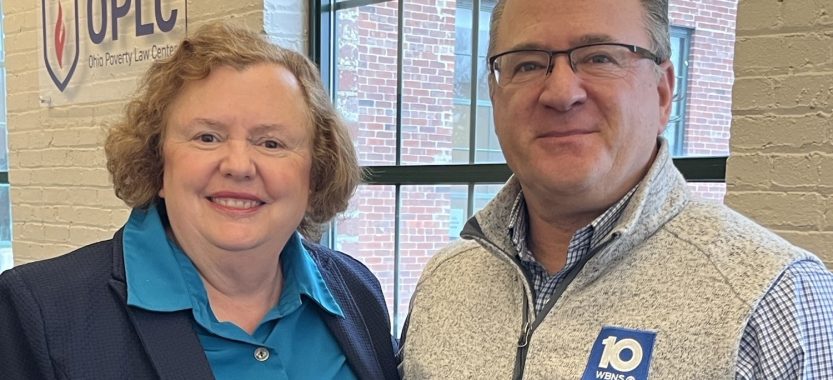
Brother’s death sparks crusade against Medicaid Estate Recovery
-
March 05, 2025
| -
By Mary Day
|
Author: Kevin Landers, Published: 6:22 PM EST February 20, 2025, Updated: 12:19 PM EST February 21, 2025
COLUMBUS, Ohio — Bob Weldon’s brother Phil died from cancer at 63, prompting a five-year mission to reform Ohio’s Medicaid Estate Recovery law.
Estate Recovery seeks to obtain repayment for the cost of Medicaid benefits once a Medicaid eligible individual is deceased. This happens after the death of a Medicaid individual who was either permanently institutionalized or age 55 and older.
According to the Department of Medicaid, in 2023, 3.2 million Ohioans or 35% of the states population, received Medicaid benefits. It is the nation’s largest public health insurance program and is funded with state and federal dollars.
But how many people know they have to pay that money back? A 10TV investigation found few do.
Read the Pro Seniors Fact Sheet about Medicaid Estate Recovery
Other Pro Seniors’ Fact Sheets
If you are age 60 or over – or calling on behalf of an Ohio senior – call the
Pro Seniors Legal Helpline for a no-cost 30-minute phone appointment.
Call Pro Seniors’ Intake line, Monday – Friday, 9AM-3PM: 513-345-4160.
Weldon claims state agents assured him the coverage for his brother was free, yet Medicaid billed his brother $3,570 for two months of care. Ohio’s Medicaid program declined to comment on these concerns
“People who sign up for this have no idea that this comes with a payback,” Weldon says.
According to Pro Seniors, which provides free legal services for those 60 year and older, Medicaid Estate Recovery applies to those who receive long term care and anyone on Medicaid over the age of 55.
Teresa Head-Gordon faced a $195,000 bill after her mother’s death, despite her mother only receiving $12,000 annually from Social Security.
“I think this is predatory,” Head-Gordon says.
Ohio is one of the most aggressive states in the country when it comes to estate recovery. In 2024, the state collected $94 million, according to a 10TV public information request to the Ohio Attorney General’s office.
Ohio’s approach had led to legal challenges, including a federal lawsuit by Bradley Plaisted of Cincinnati.
Upon his wife’s death from cancer, the state placed a lien on his home. “I don’t have $67,000. If I lose my house there’s nothing I can do,” he said.
State lawmakers are taking notice. Democrat Sean Brennan and Republican Jeff LaRe are co-sponsoring House Bill 681, which would require clear notification of Medicaid repayment obligations.
The bill, which was filed Thursday, was introduced last general assembly but was never voted on. This session, the bill has been re-worked with the approval of the Ohio Department of Medicaid [ODM] program.
Here’s what the bill would do if it passes:
- Imposes notification requirements regarding the Medicaid estate recovery program.
- Requires the Department of Medicaid to provide notice of the Medicaid estate recovery program, including specified information, both when an individual applies for and is approved for Medicaid.
- Also requires ODM to develop (1) a consumer-focused notification explaining how the Medicaid estate recovery program works and (2) a notification for Medicaid recipients who may be at risk of being subject to the Medicaid estate recovery program, listing available resources.
- Requires ODM to adopt rules to implement the bill’s notification requirement
“It can’t be a single notification buried in 40 pages of documentation,” Representative La Re tells 10TV.
While Ohio lawmakers have no plans of getting rid of estate recovery, Illinois Democrat Congresswoman Jan Schakowsky believes the program should be dismantled. She’s introduced a bill in Congress to do just that.
“This is a program that has to be eliminated right now. It doesn’t work. It’s the only agency in government that cares for people that actually sends them in a check and it times to end. I think predatory lending is an apt description of what this is,” she says.
In fact a government report in 2021 recommended: “Congress should amend Section 1917(b)(1) of Title XIX of the Social Security Act to make Medicaid estate recovery optional for the populations and services for which it is required under current law.”
The report went [on] to suggest, “States should not be allowed to pursue recovery for: (1) any asset that is the sole income-producing asset of survivors; (2) homes of modest value; or (3) any estate valued under a certain threshold. The Secretary should continue to allow states to use additional hardship waiver standards.”
As the debate continues, Weldon remains committed to his cause.
“I’m going to do my darndest to get it fixed,” he vows, hoping to prevent others from facing unexpected bills while grieving the loss of a loved one.
You can read more about how estate recovery works here.
-
Tags:
- Estate Recovery, Legal Helpline, Medicaid
